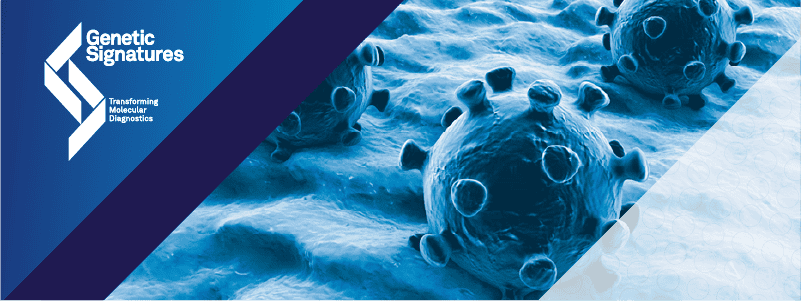Genetic Signatures Confirms Reliable Detection of Emerging COVID-19 Variant, NB.1.8.1

Genetic Signatures SARS-CoV-2 Detection Kit detects recent SARS-CoV-2 Omicron variant NB.1.8.1.
As Australia moves into the winter season, local health authorities are urging communities to receive booster COVID-19 vaccinations, particularly for more vulnerable populations, as a rise in COVID-19 cases is anticipated in the coming weeks. This urgency has been fuelled by the recent detection of a new, highly contagious Omicron subvariant NB.1.8.1.1 This emerging variant has now been reported across multiple Australian states, with some regions recording variant NB.1.8.1 as the dominant strain of COVID-19 infections during May 2025.
Detect with confidence with 3base® technology
Detection of SARS-CoV-2 using PCR technology remains the most reliable and sensitive method for diagnosing COVID-19. However, PCR performance can occasionally be affected if new variants emerge with mutations within specific regions of the viral genome that are targeted by the PCR test.2, 3, 4
Unlike conventional PCR testing, Genetic Signatures’ proprietary 3base® technology offers a unique advantage in detecting the rapidly evolving SARS-CoV-2 virus by simplifying sequence variation across pathogen genomes. This makes 3base® assays more resistant to genetic variation, ensuring reliable detection of all known COVID-19 variants to date, including the recently identified Omicron subvariant NB.1.8.1. As a result, clinical laboratories can test for existing and emerging variants with greater confidence.
| “ |
Scientific in silico analysis confirms that Genetic Signatures’ molecular solution for SARS-CoV-2 detects all known sequences of the NB.1.8.1 variant in both Australia and New Zealand. |
” | ||
|
|
To ensure ongoing assay robustness, Genetic Signatures routinely performs in silico analysis of the SARS-CoV-2 gene targets in the EasyScreen™ SARS-CoV-2 Detection Kit (N-gene and M-gene) against variants in the international GISAID database.5 Table 1 demonstrates that 3base® technology enabled 100% alignment with all assessable NB.1.8.1 sequences for the SARS-CoV-2 M-gene targeted by the assay. Similarly, 100% alignment was observed for the N-gene forward PCR primer and probe, with only a single mismatch in one reverse primer sequence, predicted to have no impact on performance.
Table 1. In silico analysis of the EasyScreen™ SARS-CoV-2 Detection Kit (RP012) to GISAID sequences in the Omicron NB.1.8.1 clade demonstrates 3base® conversion effectively maintains perfect alignment with 100% of the M-gene target sequences and with 99% of the N-gene target sequences to enable efficient PCR detection.
| |
SARS-CoV-2 gene target | # of GISAID sequences | Forward PCR primer alignment (%) | PCR probe alignment (%) | Reverse PCR primer alignment (%) | ||
| |
M-gene | 100# | 100% | 100% | 100% | ||
| |
N-gene | 101 | 100% | 100% | 99%* | ||
| * One sequence has a single mismatch under the reverse primer in a location that will not affect assay performance # Of the 101 NB.1.8.1 sequences in GISAID from Oceania as of 30 May 2025, one sequence did not include the M-gene region. ^ Australian sequences are from New South Wales, Victoria, Western Australia and South Australia. | |||||||
The EasyScreen™ SARS-CoV-2 Detection Kit has reliably maintained its performance over many years despite the presence of thousands of variants identified since the original Wuhan virus was discovered in 2019.6 This highlights the ongoing resilience of 3base® assays to genetic mutation – providing diagnostic laboratories and clinicians with greater confidence in detecting existing and emerging variants.
For availability and regulatory clearance of the EasyScreen™ SARS-CoV-2 Detection Kit and other EasyScreen™ solutions in your region, contact your local Genetic Signatures representative using the form below.
Contact Us
Genetic Signatures offers automated medium and high-throughput sample processing and syndromic PCR detection for a wide range of respiratory and gastrointestinal infections.
Learn more about Genetic Signatures solutions here.
References
-
World Health Organisation (WHO), 2025, Tracking SARS-CoV-2 variants, [online], accessed on 30/05/2025, https://www.who.int/en/activities/tracking-SARS-CoV-2-variants/
-
Shen, Z. et al. Genomic diversity of severe acute respiratory syndrome-coronavirus 2 in patients with coronavirus disease 2019. Clin. Infect. Dis. 71, 713–720 (2020).
-
Tahamtan A, Ardebili A. Real-time RT-PCR in COVID-19 detection: issues affecting the results. Expert Rev Mol Diagn. (2020) 20:453–4. doi: 10.1080/14737159.2020.1757437
-
U.S. Food and Drug Administration, 2021, SARS-CoV-2 Viral Mutations: Impact on COVID-19 Tests, [online], accessed on 12/10/2021, https://www.fda.gov/medical-devices/coronavirus-covid-19-and-medical-devices/sars-cov-2-viral-mutations-impact-covid-19-tests
-
GISAD. [online], accessed on 30/05/2025, https://www.gisaid.org
-
Koyama T, Platt D, Parida L (July 2020). “Variant analysis of SARS-CoV-2 genomes“. Bulletin of the World Health Organization. 98 (7): 495–504. doi:10.2471/BLT.20.253591. PMC 7375210. PMID 32742035. We detected in total 65776 variants with 5775 distinct variants.
For enquiries related to this article, please contact [email protected]

